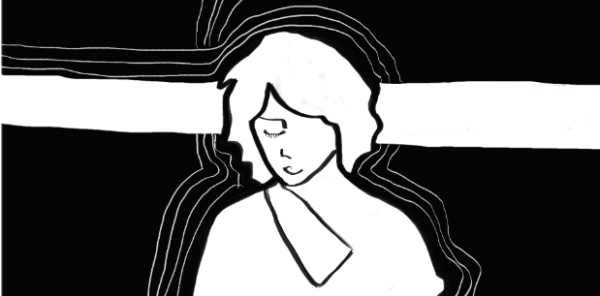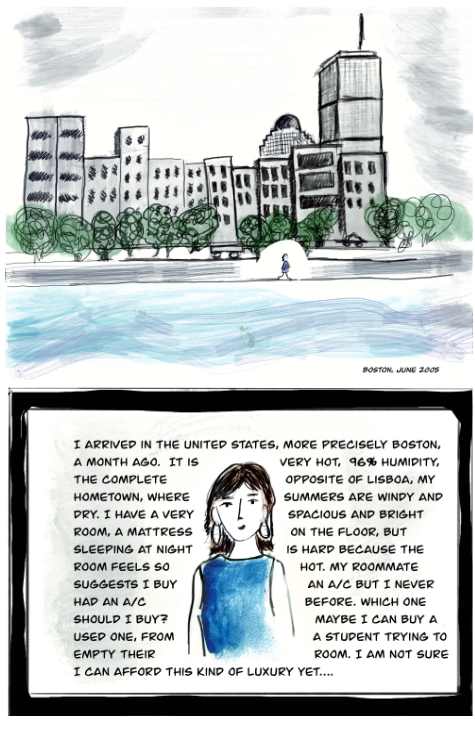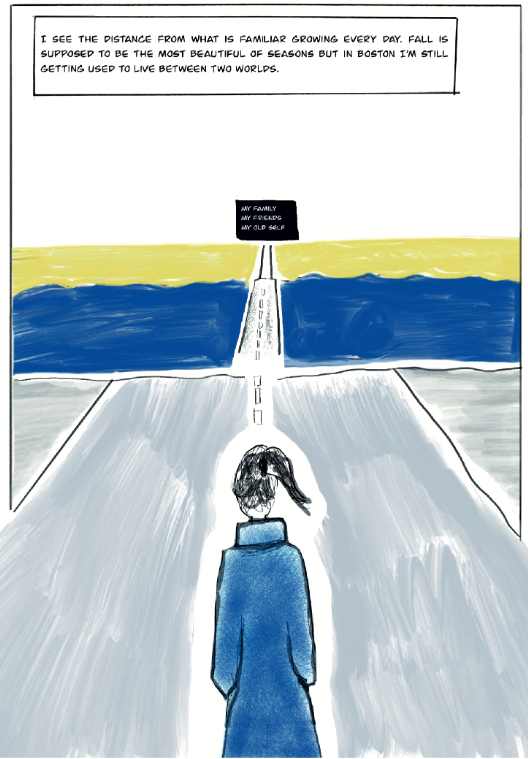

Sara Serpa
We feel we know others, but they are mostly utterly unknown to us, and we to them. The lyrics on Sara Serpa’s new album and comic book Encounters and Collisions are a bridge into very intimate wisps of private thoughts, the inner dialogue we share only with ourselves. In an effort to provide some orientation to this album, it manifests as recorded performance art, with short spoken stories interwoven with glistening vocals, saxophone, piano and cello. It is a reflection pool of glorious thought, but also real insight, a deep dive into the subterranean space of Serpa’s mind, gliding toward empathy, gliding toward understanding the immigrant experience. A million news stories are not as powerfully moving as this album’s brief lyrics and illustrations.
Serpa is a native of Lisbon, Portugal who now lives and works in New York City. In “Language,” the first musical piece, we discover the frustration of finding your voice in another country.

In “Visa”, we feel the bureaucracy, we experience the word 'alien' as applied to us. You are a “non” - non-citizen, non-resident, an immigrant, and you are homesick. In “Things must move quickly” we learn that the brutal pace of the United States can be overwhelming to immigrants.

In “Between Worlds” she gives us beautiful but cautionary lyrics:
Those of us who left / Once you Other songs discuss the weight of motherhood’s responsibilities, and grief at a father’s death. Unsaid is the guilt of leaving that father behind. “For four years, I could not look at his photograph.” Woven into these lyrics are Serpa’s vocals, which are light as a wisp of air hovering near your ear. There is a slight tugging toward Meredith Monk, a bit of Betty Carter, Cecile McLorin Salvant especially Mélusine and the intimacy of Joni Mitchell’s private thoughts on love. However, this is Serpa’s music and it is hard to label what this is. Part performance art, part StoryCorps, jazz in the ECM variant and certainly classical music.
 The album features Serpa’s longtime collaborators: Ingrid Laubrock on saxophone and Erik Friedlander on cello, with the pianist Angelica Sanchez. The roots of this music is avant-garde and experimental, which can sometimes mean a challenging listening experience, but there is a soft touch here, more the essence of the avant garde and more accessible. Erik Friedlander’s cello is so gorgeous that one might need to look away from the overwhelming beauty. This instrument has a natural emotional weight that in the right hands radiates goodness and warmth. Friedlander uses the cello like a bass, mostly favoring pizzicato instead of a bow. He has a unique finger-picking skill that can be heard on pieces such as “A Mother’s Heart.” “The Music Makes Me Who I Am” is the standout piece on this album, where the reference to Betty Carter makes the most sense and where these four musicians speak to each other in such a lovely, private dialogue. Angelica Sanchez’s piano is especially beautiful here, about two minutes in her ideas glisten above Serpa’s vocals. The composer and saxophonist, Ingrid Laubrock, adds volumes to this album, bringing her rich experience with the avant-garde set. Listen to the beginning of "Language," where Laubrock lays down the sweetest jazz sax work. Or hear the tension she delivers underneath Friedlander's cello on "Between Worlds." Some sections of this album freeze time for a second, take us out of ourselves, and hold us motionless. Let this music simply be.
Further reading:
|